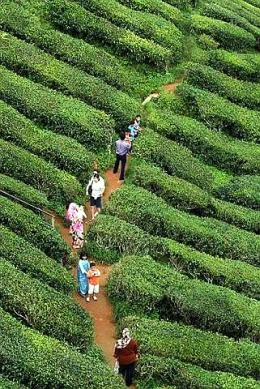Cameron Highlands is facing labour shortage because not many local people want to work in this kind of industry. I also come across many factories during my sales visit around Malaysia, and the owners tell me a similar story of their woes. I don't know why, but some of these people always think the government will take care of them, work when they like it, don't come to work when they don't feel like it. Then when the factory cannot tahan get into the red and close down, they make big complain that the factory owner run away and now no job to do. This tidak apa work attitude won't get them far. So much for Malaysia Boleh. Boleh-land is fast becoming tidak boleh-land.
Labour shortage in tea industry
By Foong Thim Leng
Monday June 14, 2010
IPOH: The century-old tea industry in Cameron Highlands is facing the possibility of an untimely demise due to manpower shortage.
Two tea plantations there have already ceased operations due to lack of suitable workers and two more are operating at about 20% below full capacity, said Malaysian Tea Producers Association chairman Datuk Kesav Kumar Agarwal.
He said the plantations on 2,400ha of land needed 1,800 workers at any one time, 20% of whom had to be replaced annually.

Time for tea: Tourists enjoying the scenic view at the Bharat tea plantation at Cameron Valley. Tea plantations may cease operations if the labour shortage continues.
"If the figures are not attained, tea production may cease in a decade or even sooner. The industry supports thousands of people directly through downstream activities like re-packing, logistics, trading, marketing and retailing.
"A significant number will be adversely affected by the untimely demise of the industry," he said.
Without local tea, he said Malaysians would then have to pay more for imported tea, adding that the country’s gross domestic product would also be affected.
"The Government can keep the industry alive by approving permits for Bangladeshis, who are willing to work in the agriculture sector and have a track record of success in this field," he said.
Kesav Kumar said the Government now only approved workers from countries like Kazakhstan, Uzbekis-tan, Pakistan and India but they were reluctant to work in agriculture-based industries.
The Home Ministry imposed a freeze on Bangladeshi workers in October 2007.
Kesav Kumar said it was impossible to employ locals as there was currently no unemployment in the Cameron Highlands.
He also appealed to the Government to allow foreign workers to be in the country for 10 years instead of five.
"The replacement worker has to be retrained and takes more than a year to become competent," he added.
Cameron Highlands has 2,500ha of vegetable farms, 480ha of flower gardens and 40ha of strawberry gardens, churning out RM580mil in annual sales.
"A significant attraction of what Cameron Highlands has for local and foreign tourists is the cool climate and the beautiful tea estates, flowers, strawberry and vegetable gardens. If they are gone, what will make visitors come?" said Kesav. -- The Star
No comments:
Post a Comment